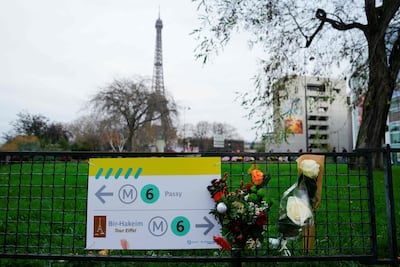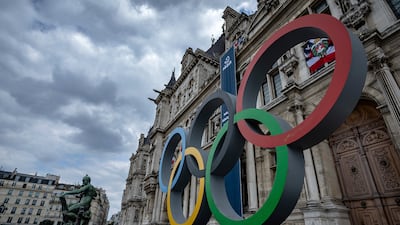The opening ceremony for the 2024 Paris Olympic and Paralympic Summer Games has been billed as “bold, original, unique”.
Picture 160 boats sailing the River Seine, carrying 10,500 athletes waving their country’s flags as artists perform in the water. More than 600,000 people cheer them on as they glide past the Eiffel Tower, Notre Dame Cathedral, and the Louvre.
The reality, however, might be more subdued than what the Games’ promotional videos show. Security analysts and observers are increasingly expressing concern that the grandiose ceremony, which will necessitate mass surveillance of the crowd, the river, the sky, and of the underground transport network, might become a security nightmare.
There were calls for a “plan B” for the opening ceremony earlier this week after a tourist died in a knife and hammer attack at the weekend in an Olympic zone near the Eiffel Tower. As in similar recent attacks in Europe, the suspect seemed to have acted alone while claiming allegiance to ISIS and expressing grievances over the suffering of Palestinians in the war in Gaza.
With the expected persistence of the conflict over the next months, the terrorist threat in Europe is currently “huge”, a senior EU official said on Tuesday. The level of alert in France, a top target for extremists in the past decade, is particularly high.
“At first, everyone applauded the idea of a spectacular inauguration ceremony,” said Armand de Rendinguer, a consultant who has written several books about the Games.
“Now there’s a conflict between those who think we must show we won’t yield to threats, and others who say it’s better to be more realistic and not jeopardise the security of the French people and of the Olympic Games,” he told The National.
Sports and Olympic Games minister Amelie Oudea Castera has so far rejected such calls. She has, however, detailed “adjustment variables” that include potentially reducing the crowd allowed on the banks of the Seine and the number of artistic performances at the July 26 event. A new law will allow police to monitor crowds during the Games with algorithm-supported surveillance cameras for the first time.
“There is undoubtedly a particularly high security challenge around the inauguration ceremony. We have been aware of this since the first day and it’s incorporated in our preparations,” Ms Oudea Castera said on Monday.
Transport terror target
Another hotly debated issue is transport during the Games in France’s already congested and densely populated capital city during a time when security threats are perceived to increase.
“There are places where transport will not be ready because there will not be enough trains,” Paris Mayor Anne Hidalgo said in late November on a live TV show. Her comments triggered a sharp rebuke from transport minister Clement Beaune, who pointed at Ms Hidalgo's lack of participation at preparation meetings ahead of the Games.
Ms Hidalgo had hinted at construction work to extend the railway network between western suburbs and Porte Maillot, an access point into Paris that gives on to the Champs Elysees and the Arc de Triomphe landmark. The work, which was launched in 2021, has restricted traffic entering the capital through the area.
“We are doing everything to be ready,” the RATP group, which operates public transport in Paris, told The National by email. Between a million and 1.5 million extra travellers are expected on some days during the Games, which will require an “exceptional availability” of personnel, including 290 more drivers that are currently being recruited, they said.
Public spaces, including transport, are considered high-risk areas during sports events. One of the locations of the November 2015 Paris attacks, which killed 130 people, was outside the Stade de France, the country's largest stadium and main Olympic venue.
Members of the cell behind the attacks, which also organised the March 2016 metro and airport suicide bombings in Brussels that killed another 32 people, said during their trial that they had planned to hit Paris again in July during the Euro 2016 football championships.
The latest figures of the Paris Region Institute, a mostly state-funded research centre, show that more than one third of the region’s inhabitants are worried about crime and terrorism on public transport.
“Targeting France during the Olympic Games is a top priority for terror organisations,” said Jerome Poirot, who was deputy of the national intelligence co-ordination office of the French presidency between 2009 and 2015.

Lone wolf threat
The head of France’s general directorate for internal security, Nicolas Lerner, described the terrorist threat as “very high” last July – four months before the surge in tensions caused by the Israel-Hamas war. The “primary threat” comes from so-called “lone wolves”, most often born in France and with no direct link to terrorist organisations, Mr Lerner said in an interview with daily Le Monde.
Lone attackers generally kill fewer people than organised groups but their symbolic effect is significant. “If there’s another knife or hammer attack in Paris or in its suburbs on the day of the opening ceremony, do you think it'll go ahead? It’s impossible,” Mr Poirot told The National.
The Paris police have a plan to counter such threats which it made public last week. Some metro stations will be closed in high-security areas and traffic banned in certain so-called red zones, head of Paris police Laurent Nunez said. “We can’t have open metro stations in protected perimeters with people who haven’t been searched,” Mr Nunez told local daily Le Parisien.

Crowds will be monitored by a 40,000-strong police force to be deployed on inauguration day, a figure that will then be reduced to 30,000 on average during the Games, which will end on August 11. They include special forces, dog-handling teams, and divers. Security forces will also be stationed at 41 competition sites in France, including a surfing competition in French Polynesia.
“Politically, it’s difficult to admit there’s a need for a plan B for the opening because many believe it would provoke even more anxiety than there is now,” Mr de Rendinguer said.
In his view, a plan B would probably involve a ceremony in a closed stadium – an option most Olympic Games organisers have adopted in the past. The ceremony could also be cancelled as a last-resort measure.
Getting rid of the ambitious show on the River Seine, which many hope will further enhance France's international prestige, "is not something I hope for”, Mr de Rendinguer added. “But to take risks is one thing, and right now we are multiplying them to infinity.”


